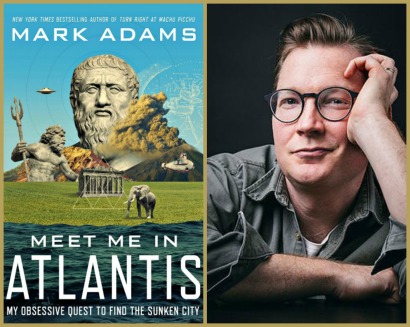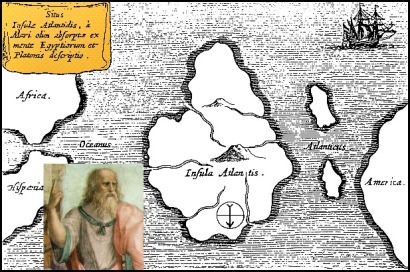Attention displaced bookworms! This month our book review columnist, Beth Green, an American expat in Prague (she is also an Adult Third Culture Kid), is exploring a new book in one of her favorite genres, mystery—only this time the mystery has to do with an ancient place and travel.
—ML Awanohara
Hello again, Displaced Nationers!
Here in Europe, the spring weather has me in a mood for getting outdoors and exploring—but, alas, I’ve been inside submerged in this month’s book pick, Meet Me in Atlantis: My Obsessive Quest to Find the Sunken City, by Mark Adams, which has just the right ingredients to appeal to international creatives. After all, didn’t we all venture abroad looking to solve at least one mystery and/or locate a utopian society?
Adams, who spent his career editing adventure and travel magazines, says he thrives on combining “travel writing with deep research and reporting.” (He is the bestselling author of two previous nonfiction books: Turn Right at Machu Picchu and Mr. America, a biography of “muscular millionaire” Bernarr Macfadden.)
Meet Me in Atlantis came out in March, and, yes, Adams does take a deep dive into uncovering the real story behind this fabled sunken city! As he puts it:
…this is a detective story, one that starts in ancient Greece and follows a twisting path through (to list just a few locations) Pharaonic Egypt, Nazi Germany, and contemporary Saint Paul, Minnesota.
Sinking one’s teeth into the Atlantis story
The mystery Adams is trying to solve isn’t so much a “who” or a “where” as a “why” and a “how”. Why do people keep trying to find the legendary city of Atlantis? And how did it get lost, anyway?
Adams starts off, as any good detective would, at the scene of the crime—two dialogues written by Plato more than 2,000 years ago, Timaeus and Critias. According to Plato, Atlantis represents the antagonist naval power that besieges “Ancient Athens”—the pseudo-historic embodiment of Plato’s ideal state. Athens is able to repel the Atlantean attack, thereby proving its superiority.
Plato’s descriptions of the society—lost even when he wrote about it—serve as a textual treasure map. Among the features mentioned are “the rings, the earthquakes, the elephants, the location outside the Pillars of Heracles.”
It’s these seemingly concrete details that have enticed a whole group of people, known as Atlantologists, to search for the ruins of the island nation, which, as legend has it, fell out of favor with the gods and submerged into the Atlantic Ocean. And it’s the absence of other sources—every single clue comes from Plato—that makes the search so hard, some would say infuriating.
Meet today’s Atlantis sleuthhounds
Atlantologists (doesn’t exactly trip off the tongue!) are more numerous than I’d realized. Adams’ interviewees range from historians, archeologists and geologists whose work loosely concerns Atlantis, to laypeople who find themselves caught up in the mystery of the lost city.
Now, I’m the kind of person who loves to seek out obscure places that catch my attention for some reason. Once when I was living as an expat in China, I spent a few days with my partner without a map or Internet access trying to find packed-mud forts built hundreds of years ago by Hakka clans in the Guangdong countryside. Another time, in Inner Mongolia, we took a bus 10 hours across the desert each way to find a specific grove of poplar trees my partner had once heard about at a dinner party three years before. (How we even managed to remember the trees after the beer consumed at the dinner is another mystery!)
But I digress. Returning to Adams’ book: for me, the most entertaining aspect are the people. I appreciated his light-hearted touch when presenting the cast of modern-day characters who continue searching for Atlantis.
For instance, he describes one of the historians he interviews as follows:
Coleman looked like a Broadway casting director’s idea of a state librarian—tall, white-haired, tie askew. His office was as comically perfect as a stage set, too: precarious piles of ancient hardbound books, sepia maps of Minnesota on the walls…
Another Atlantologist is so intent on explaining data, he misses Adams’ repeated requests to use the restroom. Several characters he interviews don’t want to be known as Atlantologists at all—it’s regarded as pseudoscience by many academics.
“The great Egyptian age is but a remnant of the Atlantian culture…” (from the song “Atlantis,” by Donovan Leitch)
But wait, Adams isn’t writing a spoof but an exhaustive book on the Atantis myth. Light-hearted he may be, but it soon becomes clear he wants his readers to care as much as he does about the whether or not Atlantis existed. He includes sections on Pythagoras, on warring peoples, on ancient catastrophes, and on the question of whether an ancient scribe could have transposed numbers. And, though it would be satisfying to suddenly debunk the Atlantis myth as a series of typos or an allegory using math as symbols, Adams remains skeptical. He also doesn’t give much credence to the new theories about Atlantis that have cropped up in the last 10 years (more than in the past 2,400 years thanks to tools like GoogleEarth).
Adams wouldn’t approve, but my personal favorite is the one that was propagated by a 19th-century ex-U.S. congressman from Minnesota. Sometimes referred to as the “father of the 19th-century Atlantis revival,” Ignatious Donnelly published a pseudo-scientific book Atlantis: The Antediluvian World forwarding the idea that the existence of Atlantis would explain supposed similarities between ancient civilizations of the Old and New Worlds. As Adams recounts:
Pyramids stretching from Egypt to Peru to India to Mesoamerica indisputably share an Atlantean source despite their having been built in hugely different styles over thousands of years. The use of bronze, mummification of the dead similarities of language—Donnelly assembled every available scrap of evidence to support his diffusionist idea of a benevolent ur-Atlantis spreading its wisdom to the far corners of the globe.
Adams has no time for a theory that says all the sophistication found in the world descends from a single Mother Culture. And of course he is right. Donnelly must have been a bit of a kook, and a condescending one at that.
Getting that sinking feeling…this mystery may never be solved!
Like all good detectives, Adams sticks close to the original source, Plato, and tries to make sense of the 2,000-year-old evidence.
After a conversation particularly dense with particulars and logical arguments, one interviewee brushes off one of Adams’ questions with a smile. “I think Plato maybe made a joke,” he tells him.
But Adams doesn’t agree. He sets out to visit Tony O’Connell, an Irishman who runs a project called The Atlantipedia. He ends up spending a week with Tony in rural Ireland, during which they narrow down the number of plausible theories about the location of Atlantis to four: southern Spain, Malta, Santorini, or Morocco. Notably, none of them are in the Atlantic Ocean, the original Platonic setting.
In sum Meet me in Atlantis is worth reading not only for its insights on the culture of Atlantology but also for the way Adams weaves philosophy, archeology, recorded history, geology and more into his investigation. I enjoyed the book’s sections on map-making, sea trade and old legends, but the part that really got my imagination going was the discussion of natural disasters. If there was an Atlantis, what happened to it? Was it wiped out by a volcanic explosion? Slammed by a tsunami? Swallowed by an earthquake? Devastated by plague? Warfare? Or, simply, did the society decline until it was no longer known by its former glory? Could Atlantis still be thriving—under another name?
By the end I wanted more. As Adams said in a recent Ask Me Anything (AMA) discussion on Reddit: “The thing about a topic like Atlantis is that you come across so many ‘holy crap’ moments that you can’t fit them all in a book.”
And perhaps that’s the best kind of mystery, the head-scratcher that may never be solved, that always leaves you wanting to search for one more piece of evidence. Adams had that kind of mystery in Manchu Picchu: the structure whose purpose no one can explain. And he has found it again in Atlantis: the kingdom for which we have a description but no physical evidence.
* * *
That’s all for this month, Displaced Nationers! Have you ever read a book that references an obscure site and been inspired to go on a madcap quest to find it? Do tell in the comments!
Beth Green is an American writer and English teacher living in Prague, Czech Republic. She grew up on a sailboat and, though now a landlubber, continues to lead a peripatetic life, having lived in Asia as well as Europe. Her personal Web site is Beth Green Writes, and she is about to launch a new site called Everyday Travel Stories. To keep in touch with her in between columns, try following her on Facebook and Twitter. She’s a social media nut!
STAY TUNED for the next fab post!
If you enjoyed this post, we invite you to register for The Displaced Dispatch, a round up of weekly posts from The Displaced Nation, and much, much more. Register for The Displaced Dispatch by clicking here!
Related posts:











